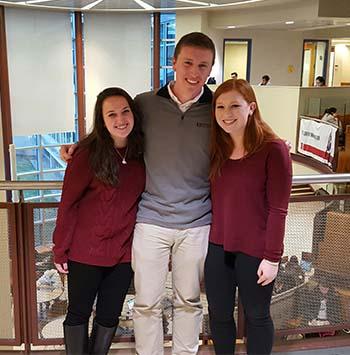Menu
Capstone Marketing Course Integrates Challenges and Skills
February 24, 2017
“I
n Professor Schewe’s course, Tools for Professional Success, we put everything together—company, industry, and consumer re
“I

“Professor Schewe was tough, demanding, but fair,” recalled Liz Imbrogna. “Still, we were far more nervous in making our final presentation to him than to the client. But his high expectations helped make our subsequent presentation to the client more fluid, more natural,” added Rachel Kirshtein.
While much of their research targeted the Northeast’s college student population, the students also explored opportunities for Peter Pan’s charter services and general ridership. The team’s research drew on published literature and fieldwork—the latter including interviews with transportation experts, college students, and Boston’s South Station travelers. The team conducted student focus groups and devised an online Qualtrics questionnaire, fielding responses from students at 20 universities.
“No surprise—price and location were big factors for the students,” observed Imbrogna. Many of them, she noted, considered bus fares to be pricey. The team members recommended judicious targeting of loyalty/rewards programs, student promotions, and additional direct routes. They also advocated consumer-friendly, more to-the-point social media initiatives and renewed investment in student influencers on campus.
All of those initiatives, the students emphasized, are timely in a changing market landscape. “In the Massachusetts student market, there are fewer competing bus companies,” noted Warren. “It’s pretty much between Peter Pan and Greyhound.” But, he continued, Facebook and other social media websites facilitate ride sharing. “So does Zipcar,” added Kirshtein, “which offers students convenience and flexibility.”
Although the students’ final presentation and written report were concise—“I’d never written anything so condensed and to-the-point,” noted Kirshtein—the research trajectory was at times untidy. “Toward the end of our research, we went into South Station in Boston to chat with different cross-sections of consumers,” Imbrogna recalls. “We learned a lot about them and that broadened perspective helped us in evaluating our student population.” Focus groups—also late in the game—played a role in the team’s recommendations for student influencers, loyalty/rewards programs, and weekday charter services.
“Professor Schewe checked in on us every step of the way,” recalls Warren. “But as we gained his confidence, he gave us more and more leeway. “He was an outstanding mentor,” observed Kirshtein. “We learned a great deal from our research, from each other, and, of course, from Professor Schewe. In other words, it was a fantastic learning experience!”